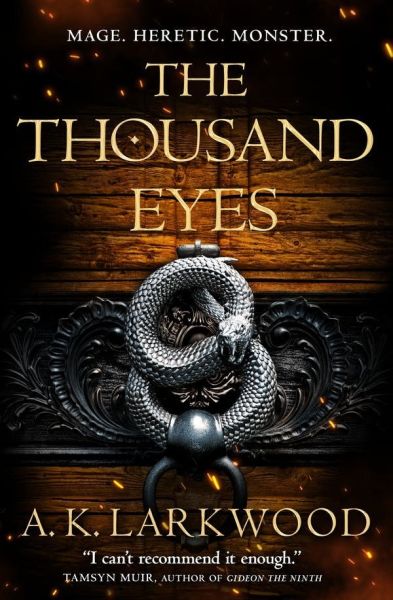Gotta Have Faith
The Thousand Eyes (Serpent Gates, volume 2)
By A. K. Larkwood

23 Feb, 2023
0 comments
2022’s The Thousand Eyes is the second and final book in A. K. Larkwood’s secondary-universe sword-and-sorcery Serpent Gates duology.
Having survived the thrilling events of The Unspoken Name, retired divine sacrifice Csorwe, her lover (the scholar-mage Qanwa Shuthmili), and their duelist pal Talasseres Charossa have become murder-hobos for hire, protecting the inquisitive as they foolishly commit archaeology in a multiverse filled with things about which mortals are happier not knowing1.
Currently, their employer is one Dr. Ilver Tvelujan, an ambitious historian with an underdeveloped sense of self-preservation. Tvelujan won’t be making past the next paragraph.
While delving into the relics of a long-vanished empire, Tvelujan and company happen across Cherenthisse, servant of a long-gone (supposedly) snake goddess. Cherenthisse has been preserved in stasis since the goddess, in a fit of rage, killed her followers and brought down the empire. Once freed, Cherenthisse wastes no time in off-handedly murdering Tvelujan for no particularly compelling reason. Having done so, Cherenthisse is at a loss as to what to do next.
The prudent thing to do with a fanatical servant of a long-vanished all-conquering empire would be to stick a knife in her eye, loot the body, and leave it rot in the ruins. What our heroes actually do is bring Cherenthisse back to civilization. This act of charity dooms multitudes.
The goddess’s followers are only mostly dead. Cherenthisse wasn’t the only servant preserved in stasis. Cherenthisse locates and revives the survivors of a small army of fanatical minions called the Thousand Eyes. Next on the to-do list? Resurrect their dead goddess.
In less time than one might expect, Cherenthisse and the other minions have organized and attacked. They are poised on the brink of victory. Only Csorwe, her plucky chums and their allies have any chance of preventing the resurrection of the dead goddess and the rise of a new serpent empire!
Fifteen years after their abject failure, Csorwe is trapped in a fate worse than death. Shuthmili is working for the evil empire in a desperate bid to rescue Csorwe. And Talasseres? Talasseres is about to discover what happens to resistance members who are insufficiently cautious.
~oOo~
The moral of this story (aside from “kill all archaeologists”) appears to be “living gods are pesky.” Make that “all gods are pesky, even the dead ones.” As long as a small spark of divine nature exists, it yearns for resurrection. One way to resurrection is possessing mortals, by force or by guile (“I will gladly grant you a miracle Tuesday for a host body today!”). Indeed, divine possession appears to be as common a malady in this multiverse as measles was in the 1960s and will be later this decade.
You might say that only a handful of people actually get possessed. That is true … but many who escape that fate are collateral damage in the catastrophes that follow. There’s a reason this setting has so many vanished empires and long-dead worlds.
I didn’t enjoy this book as much as I liked the first volume. First: Csorwe isn’t the protagonist for a significant chunk of the narrative (and I liked her). Second: sympathetic characters have a very hard time staying properly dead, even when there should be no hope of survival. Third: the novel seems much longer than it needed to be. A leaner version would have been stronger.
Nevertheless, this book is a satisfactory conclusion to the duology, not least because it is actually a conclusion. Larkwood’s prose is sufficient to the task. There’s lots of thrilling action and the stakes are high, on both personal and cosmic levels. I look forward to the next Larkwood.
The Thousand Eyes is available here (Amazon US), here (Amazon Canada), here (Amazon UK), here (Barnes & Noble), and here (Book Depository). Chapters-Indigo now has a rudimentary site, restored from back-up, but I could not find The Thousand Eyes on it.
1: Which is different from “that which mortals were not meant to know.” The gods don’t necessarily object to mortals learning certain obscure facts, as horrifying revelations make mortals easier to exploit.
